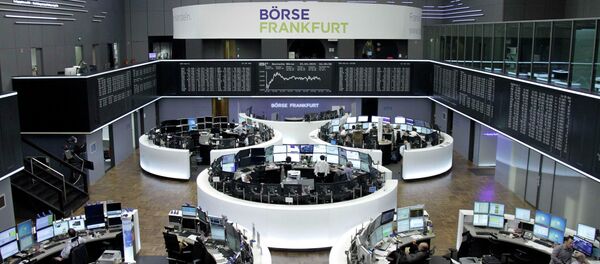Kristian Rouz — According to data posted by the European Central Bank (ECB), commercial lending in the Eurozone expanded this past March after some 36 months of steady contraction, suggesting a bold pickup in economic growth. The immediate and most evident consequence of the increased borrowing by both European businesses and households is the feverish demand for bonds issued by select Eurozone member-state governments.
The month-on-month increase in March against this February's reading equaled 0.2%.
The pickup in commercial credit is largely attributed to the set of unconventional monetary policies, introduced by the ECB early this March. However, the numbers show that the Eurozone's lending has been moving toward a positive reading since at least May 2014, and is more likely linked to the German economy accelerating on a solid foreign trade surplus.
Meanwhile, the whole business process is becoming healthier in the Eurozone, as evidenced by recent quarterly profits reports. With the business cycle returning to normal, the movement of money and credit is picking up, not least due to the low borrowing costs.
The ECB report boosted demand for both the euro and select European bonds. The common currency added 0.2% to $1.1003, depressing stock markets as a possible threat to the region's foreign trade.
German bonds are in high demand after the ECB report, even though the yield on the nation's two-year papers is negative, at minus 0.273%. Investors are acutely aware that holding such securities is unprofitable in the short-term, but the European macro data may suggest it is worth it. Germany's 10-year bonds might now be promising as much as a 20% return, according to some estimates.
Such a dramatic increase in bond profitability is paradoxically not linked to increased risk or volatility. Since September 2014, European governments issued some $2.1 trillion-worth of bonds, increasing the total value of the pool of European bonds from $1 trillion to $3.1 trillion. Most of these papers have since been purchased by the ECB or national central banks as unconventional measures of economic stimulus.
The Eurobonds are attractive because the ECB has enough grounds to claim these securities will stay stable in the next year or two, as economic growth is picking up. But the actual increase in commercial lending is more important, as it shows the non-governmental sector of the real economy accelerating, suggesting longer-term profits in a healthier economy.




